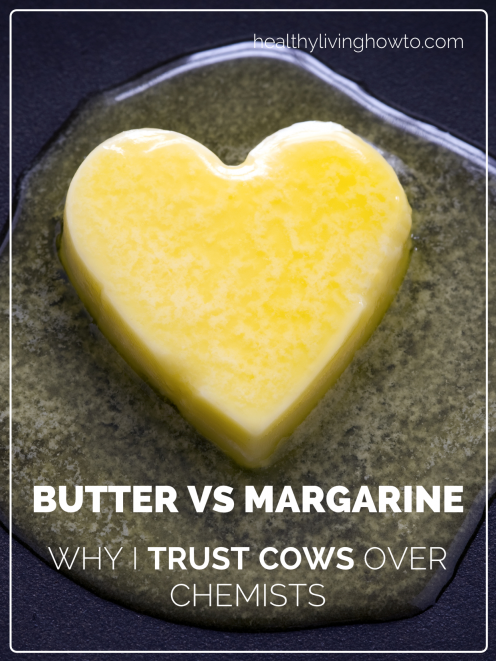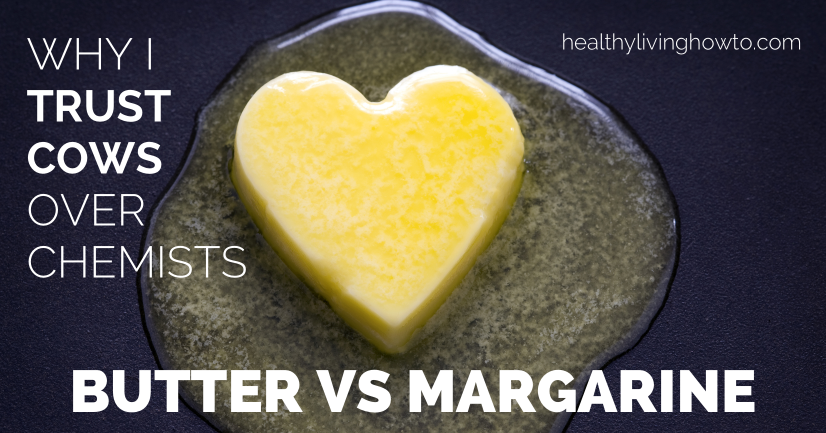There is a massive amount of nutrition misinformation on the internet. Even the professionals themselves often say things that challenge common sense and don’t seem to have a scientific basis. For example, when they tell people to replace butter with factory-made margarine…
The Difference Between Butter and Margarine
Butter and margarine serve the same purpose. They are used for cooking, baking and as spreads. Butter has been a dietary stable for centuries. It is made by churning the fatty portion of cow’s milk until it turns into the final product… butter. That’s it.
Margarine is totally different. It is a highly processed food that was invented to replace butter. The primary ingredient is vegetable oil along with emulsifiers, colorants and various artificial ingredients.
Vegetable oil is liquid at room temperature. This is why margarine is often hydrogenated, which gives it a harder consistency and extends shelf life. Hydrogenation also turns some of the vegetable oils into trans fats.
Butter is Loaded With Saturated Fat and Cholesterol
Butter has been demonized by the media and nutrition professionals because it contains large amounts of both saturated fat and cholesterol. But new studies show that this actually doesn’t matter… despite decades of anti-fat propaganda.
A large review study published in 2010 looked at 21 studies that included a total of 347.747 participants (1). They found absolutely no association between saturated fat and cardiovascular disease. Other studies lead to the same conclusion (2, 3).
Eating saturated fat actually improves the blood lipid profile. It raises HDL (the “good”) cholesterol and changes the LDL from small, dense LDL (very bad) to Large LDL, which is benign (4, 5, 6, 7, 8).
Eating cholesterol rich foods like eggs leads to the same improvements in blood lipid profiles. The LDL pattern improves and HDL goes up (9, 10). Unless you have a medical condition like familial hypercholesterolemia, then there is NO reason to fear saturated fats or dietary cholesterol.
Margarine Contains Vegetable Oils and Trans Fats
The main ingredients in most margarines are vegetable oils like soybean or safflower oil. Vegetable oils are mostly unsaturated, which is a problem because unsaturated oils are liquid at room temperature and cannot be used as spreads.
To remedy this problem, the vegetable oils are subjected to a hydrogenation process. This involves exposing the oils to high heat, high pressure, hydrogen gas and a metal catalyst. Disgusting, yes.
This process prolongs the shelf life of the products and makes them harder at room temperature. Hydrogenation makes unsaturated fats resemble saturated fats. Hydrogenated fats are also known as trans fats, which are highly toxic and strongly associated with heart disease (11, 12).
Historically, margarine used to be loaded with trans fats. Today there are some trans-fat free varieties available. However, be aware that manufacturers can label their products trans-fat free as long as there is less than 0.5 grams of trans fats per serving. To make sure you’re avoiding trans fats, read labels. If it says “hydrogenated” anywhere on the ingredients list, then avoid it.
But even though a margarine is genuinely trans-fat free, it can still be bad for you. The vegetable oils used in them, such as soybean and safflower oil, may be seriously harmful on their own. These types of oils are the biggest sources of polyunsaturated Omega-6 fatty acids in the diet, which we’re already eating too much of (13, 14).
Several studies link excess consumption of polyunsaturated vegetable oils with cancer, violence and the very thing margarine is supposed to prevent… heart disease (15, 16, 17, 18).
The Awesomeness of Grass-Fed Butter
The health effects of animal foods depend on what the animals ate. Cows eat grass in their natural environment. But in many countries, they are fed grain-based feeds.
Butter from grass-fed cows is much more nutritious. It contains more:
- Vitamin K2 – This little known vitamin plays a role in preventing many serious diseases, including cancer, osteoporosis and heart disease (19, 20,21, 22).
- CLA – Studies show that this fatty acid can have anti-cancer properties and help lower body fat percentage in humans (23, 24, 25).
- Butyrate – A short-chain fatty acid found in butter which is also produced by bacteria in the intestine. It can fight inflammation, improve digestive health and may help prevent weight gain (26, 27, 28, 29).
- Omega-3 – Grass-fed butter has less Omega-6 and more Omega-3, which is important because most people are already eating way too many Omega-6 fatty acids (29).
Given that grass-fed butter contains a lot more heart-healthy nutrients than butter from grain-fed cows, the health effects of butter can vary drastically depending on what the cow ate.
Margarine and Blood Lipids

These margarines lower total and LDL cholesterol in the short term, but they may also decrease HDL (the good) cholesterol (30, 31, 32, 33, 34). However, it’s important to stress the difference between risk factors and hard outcomes.
Just because something improves a risk factor for heart disease, such as LDL, it does NOT mean that it will actually lead to a reduction in heart disease, which is the outcome that matters.
There are many drugs that have been proven to lower LDL cholesterol, but not all of them actually lead to a reduction in heart disease. That’s because there’s a lot more than just cholesterol that causes heart disease. The studies that look at hard outcomes like heart attacks show that butter is either benign or healthy, while margarine increases the risk.
When Measuring Hard Outcomes, Butter Comes Out Ahead
When looking at actual heart attacks, there is literally no evidence that butter causes harm. A large review published in 2013 looked at 16 prospective studies.
High-fat dairy consumption was found to lower the risk of obesity, with no consistent association between dairy fat, cardiovascular disease or other metabolic diseases (35). However, the effects seem to vary between countries.
In the Nurses’ Health Study (United States), dairy fat increased the risk of heart disease, while in an Australian study it was found to lower heart disease risk by a whopping 69% (36, 37).
This drastic difference is probably caused by different feeding practices. Cows in the U.S. are mostly grain-fed, while cows in Australia eat grass and therefore have more Vitamin K2 and Omega-3s… both of which protect against heart disease.
 The Framingham heart study was an observational study that went on for 20 years. In this study, margarine was found to drastically increase the risk of heart disease, while butter had no effect (38).
The Framingham heart study was an observational study that went on for 20 years. In this study, margarine was found to drastically increase the risk of heart disease, while butter had no effect (38).
Photo Source: Stephan Guyenet.
It seems pretty clear that observational studies don’t support the idea that butter causes heart disease.
But such studies can not really prove anything, they can only show that two factors are correlated. Correlation does not equal causation.
However, we also have evidence from randomized controlled trials… which are the gold standard of research. In the Sydney Diet Heart study, 458 men that had recently had a cardiac event were randomized into two groups.
One was instructed to reduce saturated fats (includes butter) and increase their intake of polyunsaturated vegetable oils, which includes margarine (39).
 The group increasing their vegetable oil (and margarine) consumption was 62% more likely to die and 70% more likely to diet of heart disease. The blue line is the group eating the “heart-healthy” *cough* diet.
The group increasing their vegetable oil (and margarine) consumption was 62% more likely to die and 70% more likely to diet of heart disease. The blue line is the group eating the “heart-healthy” *cough* diet.
This makes perfect sense given that both trans fats and vegetable oils have been associated with cardiovascular disease and death (40, 41, 42).
Take Home Message
Given that nutrition professionals have been warning us about butter and pushing us towards processed industrial margarine, you would think that there was at least a hint of evidence suggesting this to lead to better outcomes. Alas, no. Despite margarines being able to lower total and LDL cholesterol in the short term, they actually lead to the opposite effect when measuring hard outcomes.
I highly recommend that you avoid processed pseudo-foods like margarine. Use real, grass-fed butter instead. When it comes to food, a cow is more trustworthy than a chemist.
